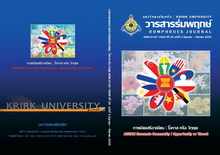การบริหารจัดการแรงงานของธุรกิจไทย ภายหลังพม่าปฏิรูปประเทศ และ AEC มาถึง
Main Article Content
Abstract
Labor Management of Thai Business after Myanmar Policy Reform and Towards AEC
Under ASEAN Economic Community (AEC) framework that required the co-operation of ASEAN members to achieve the end goal by 2015, this will increase the economic growth in this region. Especially, Myanmar which has recently reformed and democratized her state policy. This should contribute to the flow of foreign investment into Myanmar. Thailand also can engage with this advantage since Thailand has had long relationship with Myanmar in terms of trades and the value of Thai investment in Myanmar is the highest among ASEAN members. This article aimed to point out the importance of labor management and how Thai Business sector could overcome the obstacles of labor management, since it was possible that the Burmese, which most Thai business sector had relied on, would move back to their own country. This would cause the shortage of unskilled labor in Thailand. At the same time, there might be the increase of other foreign laborers from Laos and Cambodia migrate to Thailand illegally. As a result, it would cause job-fightings, social and national security problems, etc. Thus, for the long range solution, Thai business sector needed to develop the productivity of Thai labor; raise the capability of the Thai unskilled labor to the semi-skilled labor ; use modern technology in production to substitute the manpower. Moreover, the public sector had to establish mechanism to transfer the excessive labor force, especially the informal employment which was the country majority labor force to be able to meet the needs of Thai business sector. At the same time, it was necessary to limit the number of foreign laborers who immigrate lawfully to Thailand. This was done in order to decrease the number of foreign Labor. In addition, Thai business sector which still needed to use unskilled labor to lower the capital was encouraged to transfer its production bases to other neighboring countries as alternative solution.
Article Details
Every article published in the Romphruek Journal of the Humanities and Social Sciences is the opinion and point of view of the authors. Thery're not the viewpoint of Krirk University or the editored department. Any part or all of the articles for pablication must be clearly cited.


